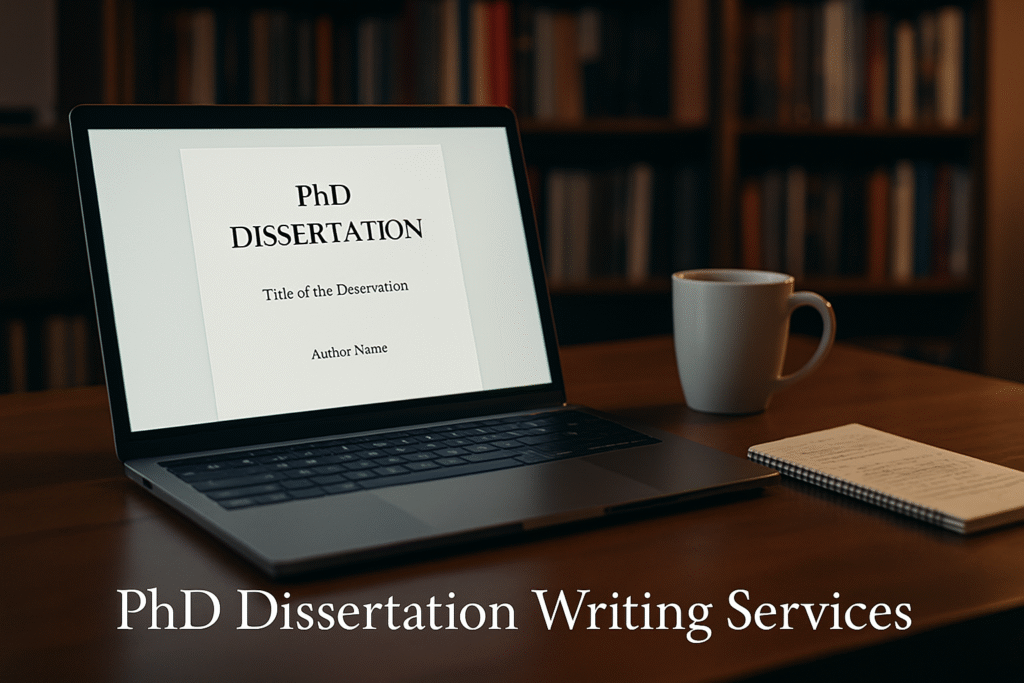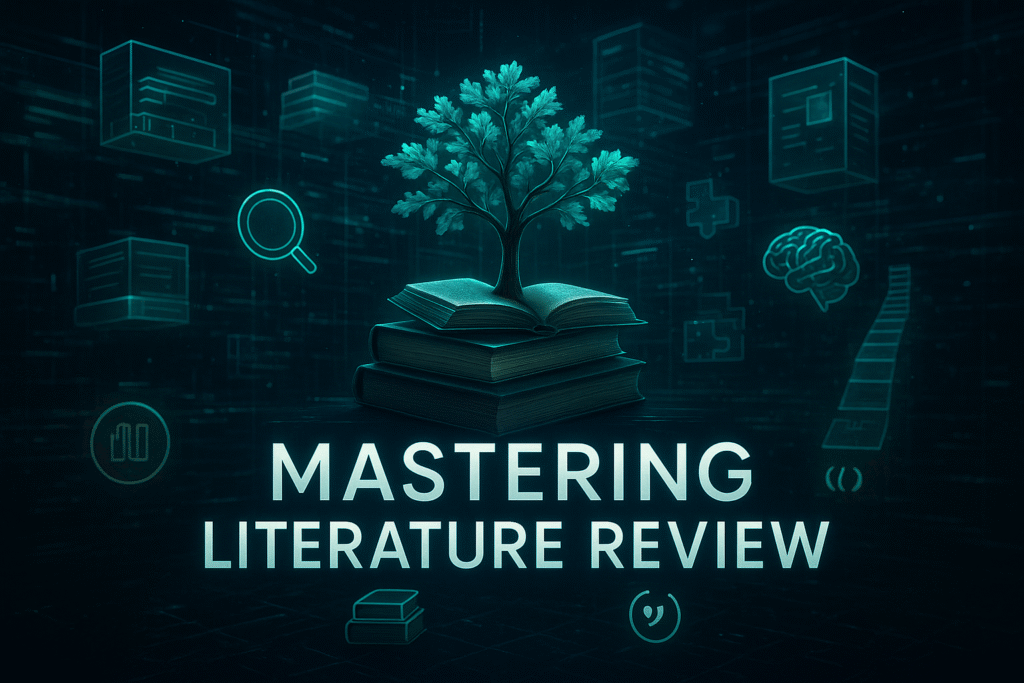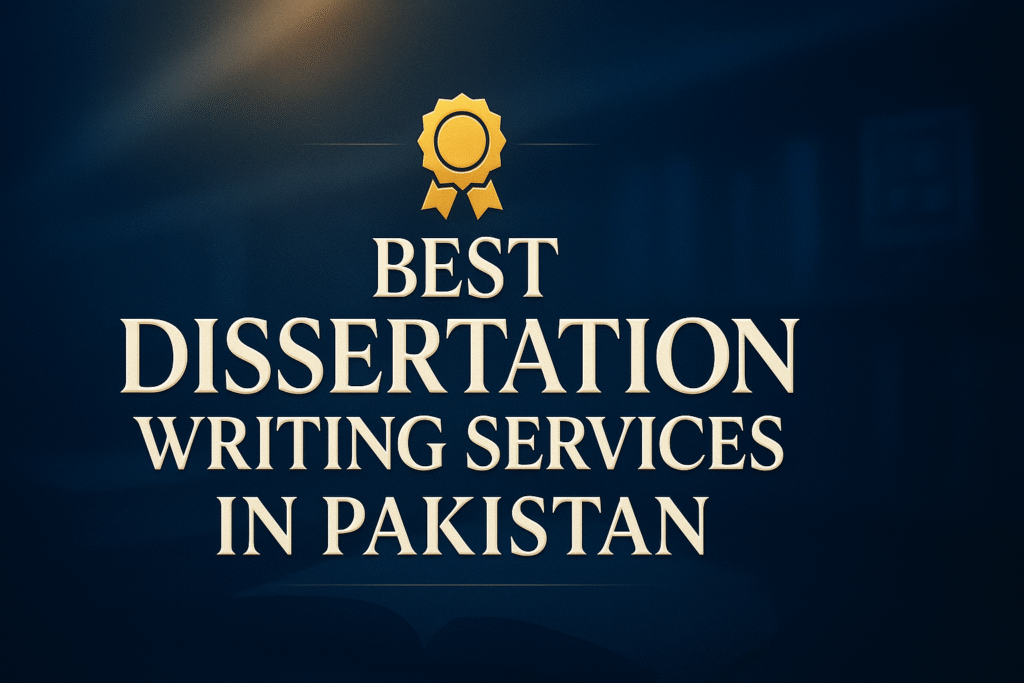PhD Dissertation Writing Services to Unlock Your Academic Potential
Completing a PhD dissertation is one of the most challenging milestones in any academic journey. The process demands not only deep subject knowledge but also advanced research, analytical, and writing skills. For many doctoral candidates, balancing these demands with other academic and personal responsibilities can be overwhelming. This is where PhD dissertation writing services from Qundeel.com can make a transformative difference.
In this blog post, we explore how professional dissertation assistance can help you achieve academic excellence, save time, and ensure your research stands out. We also provide practical checklists to guide you through each stage of the dissertation process.

Understanding PhD Dissertation Writing Services
What Are PhD Dissertation Writing Services?
PhD dissertation writing services are specialized academic solutions designed to support doctoral students at every stage of their dissertation journey. At Qundeel.com, our services are tailored to your unique research needs, ensuring your dissertation is original, well-structured, and meets the highest academic standards.
Services Offered by Qundeel.com
- Topic Selection & Proposal Writing
- Custom Research Paper Writing
- Literature Review Development
- Methodology & Data Analysis
- Full Dissertation Writing
- Dissertation Editing & Academic Proofreading
- Formatting & Citation Management
- Plagiarism Checking
Why Choose Custom PhD Dissertation Writing Services?
The Value of Tailored Research
Every dissertation is unique. Our custom research paper writing ensures your work is tailored to your research objectives, academic requirements, and university guidelines. Our PhD writing experts collaborate with you to deliver a dissertation that reflects your vision and meets your institution’s expectations.
Ensuring Originality and Academic Integrity
Originality is non-negotiable in academia. Qundeel.com guarantees 100% plagiarism-free work, using advanced plagiarism detection tools and providing detailed originality reports. Our commitment to academic integrity protects your reputation and your degree.
How Our PhD Dissertation Writing Services Work
Step-by-Step Dissertation Assistance
At Qundeel.com, we follow a transparent, student-focused process:
- Initial Consultation: Discuss your research topic, objectives, and deadlines.
- Expert Writer Assignment: Matched with a subject-matter expert.
- Research & Planning: Literature review and detailed outline.
- Writing & Drafting: Systematic chapter writing with regular updates.
- Review & Revisions: Opportunity for feedback and revisions.
- Dissertation Editing & Proofreading: Polishing for clarity and accuracy.
- Formatting & Finalization: Compliance with all formatting and citation requirements.
- Delivery & Ongoing Support: Final dissertation delivery and post-submission support.
Dissertation Preparation Checklist
Before you begin, ensure you have the following:
- Clearly defined research topic and objectives
- Approved dissertation proposal
- Access to relevant literature and data sources
- University formatting and citation guidelines
- Timeline for each dissertation chapter
- Communication plan with your assigned writer
Academic Proofreading and Dissertation Editing Services
The Importance of Academic Proofreading
Even the most insightful research can be undermined by language errors or formatting inconsistencies. Qundeel.com’s academic proofreading services ensure your dissertation is polished, professional, and ready for submission.
What to Expect from Dissertation Editing
Our dissertation editing and proofreading services include:
- Correction of grammar, spelling, and punctuation
- Consistency in formatting and style
- Improved sentence structure and flow
- Identification of ambiguities and redundancies
- Adherence to university academic standards
Editing & Proofreading Checklist
Before submitting your dissertation, check the following:
- All grammar, spelling, and punctuation errors corrected
- Consistent use of terminology and style
- Logical flow and coherence between chapters
- Proper formatting of tables, figures, and appendices
- Accurate and complete citations and references
- Compliance with university submission guidelines
Benefits of Using Qundeel.com’s PhD Dissertation Writing Services
Save Time and Reduce Stress
Writing a PhD dissertation is a time-intensive process. By partnering with Qundeel.com, you can focus on your research, prepare for your defense, and maintain a healthy work-life balance—while we handle the writing, editing, and formatting.
Access to Experienced PhD Writing Experts
Our team consists of PhD-qualified writers and editors with expertise across a wide range of disciplines. Their knowledge ensures your dissertation is academically rigorous, well-researched, and meets the latest academic standards.
Improve Your Academic Performance
With Qundeel.com’s support, you can:
- Submit a high-quality, well-structured dissertation
- Meet tight deadlines without compromising quality
- Increase your chances of publication and academic recognition
- Impress your academic committee and achieve your PhD
Real Student Success Stories
Thousands of students have achieved academic success with Qundeel.com’s PhD dissertation writing services. Here’s what some of them say:
“Qundeel.com helped me organize my research and present my findings clearly. I passed my defense with confidence!” – Ayesha, PhD in Management
“The editing team improved the flow and clarity of my dissertation. My supervisor was impressed with the final draft.” – Bilal, PhD in Computer Science
“Thanks to Qundeel.com, I published two chapters in top journals. Highly recommended!” – Fatima, PhD in Education
Frequently Asked Questions (FAQs)
Q1: Are PhD dissertation writing services at Qundeel.com ethical?
A: Yes, our services are designed for guidance, editing, and support. The final work reflects your research and ideas.
Q2: How do I choose the right dissertation writing service?
A: Look for experienced writers, positive reviews, transparent pricing, and a commitment to originality and confidentiality—qualities Qundeel.com is proud to offer.
Q3: Can I communicate directly with my writer?
A: Yes, our platform allows direct communication for seamless collaboration.
Q4: Will my dissertation be plagiarism-free?
A: Absolutely. We use advanced plagiarism detection tools and provide originality reports.
Q5: What if I need revisions?
A: We offer free revisions within a specified period to ensure your satisfaction.
Take the Next Step: Unlock Your Academic Potential with Qundeel.com
Don’t let dissertation challenges hold you back. Unlock your academic potential with Qundeel.com’s expert PhD dissertation writing services, dissertation editing, and academic proofreading. Whether you need help with a single chapter or the entire dissertation, our experienced team is here to support you every step of the way.
Take the next step towards academic excellence. Contact Qundeel.com today for a free consultation and discover how our professional services can help you succeed!
Contact us
Understanding Literature Review: A Comprehensive Example
Mastering Literature Review: A Step-by-Step Guide
A literature review is a crucial part of academic research. It provides a comprehensive summary of existing studies on a topic. Understanding how to write one is essential for students and researchers.
This guide will help you grasp the concept of a literature review. You’ll learn how to write one effectively. We will explore examples and templates, including APA style.

Literature reviews are more than summaries. They analyze and synthesize information from various sources. This process helps identify research gaps and provides context for your study.
Writing a literature review involves several steps. From defining your research scope to organizing your findings, each step is vital. This guide will walk you through each stage.
A well-structured literature review enhances your research’s credibility. It supports your arguments and provides evidence. Following specific guidelines ensures your review is clear and concise.
Whether you’re writing a research paper, dissertation, or scientific study, this guide is for you. Let’s dive into the world of literature reviews.
What Is a Literature Review?
A literature review is more than just a list of sources. It offers a comprehensive analysis of previous research on a specific topic. By synthesizing existing knowledge, it highlights key findings, theories, and gaps in the field.
This process involves reviewing various types of sources like scholarly articles, books, and reports. Each source must be credible and relevant. This ensures that the review is thorough and accurate.
A literature review serves multiple purposes in research. Some of its roles include:
- Providing context and background for new research
- Identifying gaps in existing studies
- Highlighting trends and developments in the field
Essentially, a literature review acts as a foundation for your own research. It helps refine your questions and hypotheses, setting the stage for meaningful contributions to the academic community.
Why Are Literature Reviews Important?
Literature reviews play a crucial role in academic and scientific research. They provide a solid framework by connecting past studies with current inquiries. This connection helps to clarify the research context and its importance.
These reviews also unveil gaps in existing research. By doing so, they guide researchers to unexplored areas. This ensures that new studies contribute to advancing the field rather than duplicating previous work.
Moreover, literature reviews serve to:
- Highlight significant theories and findings
- Support arguments and validate research claims
- Identify conflicting results and differing viewpoints
By setting the scene, literature reviews establish credibility. They demonstrate the researcher’s understanding and command of the topic, crucial for any research endeavor.
Types of Literature Reviews
Literature reviews vary in form and focus. Each type has distinct characteristics based on its purpose and method. Identifying the right type is vital for aligning the review with research goals.
Common types of literature reviews include:
- Narrative Review: Provides a broad overview of a topic.
- Systematic Review: Involves a detailed and structured methodology.
- Meta-Analysis: Combines data from multiple studies for statistical analysis.
- Scoping Review: Examines the scope of research in a field.
Choosing the appropriate type depends on the research question. Narrative reviews are suitable for general exploration, while systematic reviews delve into specific queries. Understanding these differences ensures the literature review aligns with the research’s focus and depth.
Key Components of a Literature Review
A well-structured literature review is key to successful research. It should include essential components to provide a comprehensive view.
The main components are:
- Introduction: Outlines the topic and significance of the review.
- Body: Discusses and critically evaluates the sources.
- Conclusion: Summarizes findings and their broader implications.
The introduction sets the stage by explaining the topic’s relevance. The body delves into the details, analyzing how each source contributes to the field. The conclusion ties everything together, highlighting the main takeaways.
Each component should flow logically. This ensures clarity and coherence, aiding in understanding the wider research context. Proper structuring also enhances the review’s credibility and readability.
How to Prepare and Perform a Literature Review: Step-by-Step Guide
Crafting a literature review requires careful planning. Following a systematic approach is crucial for effectiveness.
Start by defining your research focus. This step sets the boundaries for your review.
Next, search for and identify credible sources. These sources will form the backbone of your review.
Once sources are gathered, analyze and synthesize the information. This helps in uncovering patterns and themes.
Then, organize your findings coherently. A clear structure aids understanding and readability.
Refine your review by checking for coherence and bias. A balanced analysis builds credibility.
By following these steps, you ensure a thorough literature review process. Meticulous preparation leads to insightful synthesis and analysis.
Remember to adapt your approach as needed. Flexibility can enhance the quality and relevance of your review.
Step 1: Define Your Research Scope
Defining your research scope is the foundational step. Narrowing down the focus ensures efficiency.
A clear scope avoids overwhelming information. It provides direction and confines the review to relevant aspects.
Step 2: Search and Identify Relevant Sources
With a defined scope, start searching for sources. Use databases and libraries for credible materials.
Identify sources by:
- Checking author credentials
- Reviewing publication dates
- Ensuring source relevance
Make sure your sources are recent and authoritative. This ensures accuracy and reliability in your review.
Step 3: Analyze and Synthesize the Literature
Analyzing your sources involves a critical evaluation. Understand their contributions to the field.
Synthesize by:
- Identifying common themes
- Assessing methodologies
- Evaluating findings
This step helps in forming a comprehensive view. Synthesis reveals insights and potential research gaps.
Step 4: Organize the Review
Proper organization of your review is crucial. It aids in presenting a coherent narrative.
Organize by:
- Thematic grouping
- Chronological order
- Methodological division
A structured approach enhances flow. Logical organization boosts comprehension and engagement.
Structuring Your Literature Review
A well-structured literature review increases readability and clarity. It allows readers to follow your analysis effortlessly.
Begin with an introduction that outlines the review’s purpose and focus. This gives context and sets expectations.
Next, present the body of the review. This can be organized in different ways depending on your approach:
- Chronological
- Thematic
- Methodological
Each approach provides a unique lens through which to view the literature. Choose the one that best serves your research goals.
Finally, conclude by summarizing the main findings and their implications. A strong conclusion ties everything together and underscores the significance of the review.
Remember, consistency in structure leads to greater coherence. Tailor your structure to fit the chosen approach and the audience’s needs.
Chronological, Thematic, and Methodological Approaches
Choosing the right structuring approach is vital. Each has benefits and suits different research types.
- Chronological: Arrange by the order of events or publication.
- Thematic: Group by topic or theme.
- Methodological: Classify based on research methods.
Consider the nature of the literature and your research objectives. The chosen structure should enhance understanding and add depth to your review.
Writing the Literature Review: Section by Section
Crafting a literature review involves specific sections that build a cohesive narrative. Each section has a distinct purpose, contributing to the overall work.
Introduction: How to Start a Lit Review
The introduction sets the stage for your review. It should outline the topic and rationale.
- Explain the scope of the review.
- Highlight why this review is important.
- State your research question or objective.
An engaging introduction piques readers’ interest and provides a roadmap for the review.
Body: Literature Review Paragraph Structure
The body comprises detailed evaluations of existing literature. This section dissects the research into digestible parts.
- Start with a topic sentence.
- Analyze key studies or theories.
- Discuss methodological approaches or findings.
Each paragraph should flow logically into the next, maintaining a clear focus and relevance.
Conclusion: Summarizing and Synthesizing Findings
End by synthesizing the insights gained. Summarize how these insights advance understanding.
- Recap main points concisely.
- Address the implications of the findings.
- Suggest areas for further research.
A well-crafted conclusion reinforces the importance of your review and suggests the path forward for continued study.
Literature Review Examples and Templates
Examples and templates are invaluable for structuring your literature review effectively. They offer clear guidance on format and presentation, making it easier to organize your thoughts and findings.
To start, examine various examples to understand different styles and approaches. This can help you determine what best fits your research paper or dissertation needs.
- Look for examples in your field of study.
- Analyze how they discuss themes and methodologies.
- Note how references are formatted.
Templates serve as a blueprint, especially helpful if you follow a specific citation style, like APA. They streamline the writing process by providing a pre-defined structure.
- Identify a suitable template for your work.
- Customize it according to your research requirements.
- Ensure compatibility with your chosen citation style.
These tools offer a firm foundation, simplifying the sometimes daunting task of writing a literature review.
Literature Review Example APA Style
Using an APA style literature review example can guide you through proper formatting and citation. APA emphasizes a structured approach.
- Ensure your paper has a title page.
- Arrange citations in alphabetical order.
- Include a well-formatted reference list.
Reviewing examples shows how to apply these rules practically. They demonstrate the organization of sections, making compliance with APA rules more intuitive.
Sample of Literature Review Introduction
A sample introduction can showcase how to initiate your literature review effectively. It sets expectations and focuses your reader’s attention.
- Begin with a broad overview of the topic.
- Narrow down to your specific research focus.
A well-crafted introduction clarifies the review’s purpose and relevance. It can be a useful reference to ensure your literature review starts on a strong note.
Common Mistakes and How to Avoid Them
Crafting a literature review can be challenging, and certain common pitfalls can hinder your progress. Recognizing these mistakes is the first step to avoiding them.
One frequent issue is using outdated sources, which can skew your findings. Another is failing to synthesize information, leading to a disjointed narrative. Over-reliance on direct quotes instead of summaries can also dilute your own analytical input.
To steer clear of these errors:
- Regularly update your sources to include recent research.
- Focus on synthesizing information instead of just summarizing.
- Limit direct quotes and use your own words for analysis.
By being aware and taking preventive measures, you can enhance the quality and impact of your literature review.
Tips for an Effective Literature Review
Crafting a compelling literature review requires careful attention to detail and strategy. A focused approach will ensure your review stands out.
Start by maintaining a clear purpose and direction throughout your writing. Avoid tangents that can confuse readers and muddle your primary theme.
Consider these tips:
- Use reliable and diverse sources to support your arguments.
- Organize information logically for better flow and readability.
- Regularly revisit your main research questions to stay on track.
By implementing these strategies, your literature review will be insightful and impactful.
Frequently Asked Questions About Literature Reviews
Many students and researchers have common questions about literature reviews. Addressing these can clarify the process and expectations.
Here are some FAQs:
- What is the primary purpose of a literature review?
- How long should my literature review be?
- What are the best sources for my review?
Understanding these fundamentals can enhance the quality and clarity of your literature review. Research widely and consult advisors to address any specific queries.
Conclusion: The Value of a Well-Written Literature Review
A well-written literature review offers more than just background information. It enhances the credibility and depth of your research.
In conclusion, investing effort into a thorough literature review supports academic growth. It provides a strong foundation for new insights and discoveries.
Best Dissertation Writing Services in Pakistan – Qundeel.com
If you’re a PhD or MPhil student searching for credible, experienced, and student-focused dissertation support in Pakistan, your search ends at Qundeel.com. We are Pakistan’s premier academic writing and consultation service provider, delivering personalized assistance to postgraduate researchers both locally and internationally. From face-to-face guidance in our office to online consultations via Zoom, our services are tailored to meet the diverse needs of today’s research scholars.

Why Qundeel.com is Pakistan’s Most Trusted Dissertation Partner
With over a decade of experience, Qundeel.com has earned the trust of thousands of postgraduate scholars from across Pakistan, the UK, the USA, the Middle East, and beyond. What sets us apart is our one-on-one commitment to each student. Our services go beyond traditional writing support—we work as your academic partner to ensure your research journey is smooth, meaningful, and academically sound.
What We Offer:
✅ Customized Topic Selection: We don’t pick random titles—we work closely with you to select a research topic that aligns with your field, academic goals, and university requirements. Whether you’re in education, management sciences, psychology, medical sciences, or computer science, our consultants are trained in crafting topics that are both researchable and relevant.
✅ PhD & MPhil Proposal Writing: Your proposal is the foundation of your research journey. We help you structure it correctly—from crafting a strong problem statement and literature review to formulating realistic objectives and methodology. Our writers follow international university guidelines and include in-text citations and referencing in APA, Harvard, or your preferred format.
✅ Dissertation and Thesis Writing: We provide end-to-end support for full dissertation writing. Whether you’re starting from scratch or stuck at a particular chapter (Introduction, Literature Review, Methodology, Data Analysis, Conclusion), our subject specialists can take over and guide you toward a successful submission.
✅ SPSS, AMOS & NVivo Analysis: Quantitative or qualitative, we’ve got you covered. Our data analysts are experts in statistical software such as SPSS, AMOS, SmartPLS, R, and STATA. For qualitative studies, we offer NVivo support including coding, thematic analysis, and interpretation.
✅ Zoom-Based Sessions for International Students: For PhD students residing in the UK, USA, Canada, or Australia, we offer scheduled Zoom meetings to discuss your work in real-time. No generic emails, no robotic responses—just direct, human-centered consultation with academic experts who understand your field.
✅ In-Person Consultations (Pakistan): Unlike other online-only platforms, Qundeel.com offers face-to-face meetings in Pakistan. You can visit our office in Gujranwala or book a slot to meet us in Lahore, Islamabad, or Karachi (by appointment). This physical accessibility adds an extra layer of trust, accountability, and comfort to our clients.
✅ Publication Support (Scopus & HEC Recognized Journals): Want to get your article published in a reputable journal? We offer assistance in drafting, formatting, submission, and responding to reviewers’ comments for Scopus and HEC-recognized journals.
✅ Turnitin & Grammarly Reports: Every document we deliver is plagiarism-checked and quality-assured. We provide free Turnitin and Grammarly reports to maintain transparency and meet university standards.
Who Can Benefit from Our Services?
Our services are designed for:
- PhD students (local and international)
- MPhil scholars in Pakistan
- Master’s students writing dissertations
- Research supervisors who want consultation
- International students needing remote help via Zoom
- Working professionals completing a part-time doctoral degree
Whether you’re conducting field research in education, analyzing SPSS data for a psychology thesis, or writing a proposal for a professional doctorate in health sciences, Qundeel.com can provide the tailored support you need.
Why Choose Qundeel.com Over Others?
🔹 Face-to-Face Meeting Option – No other online dissertation company offers physical meetings in Pakistan.
🔹 Zoom Consultations Globally – We serve students in the UK, US, and Gulf region via online one-on-one sessions.
🔹 Verified Academic Experts – Our team includes PhD holders, statisticians, university lecturers, and published authors.
🔹 Fully Confidential – We protect your data and ensure full confidentiality.
🔹 Affordable Pricing – Packages designed with student budgets in mind.
🔹 Quick Turnaround – Deadlines are sacred. We deliver quality work within agreed timeframes.
🔹 After-Sales Support – Revisions, clarifications, and defense preparation included.

